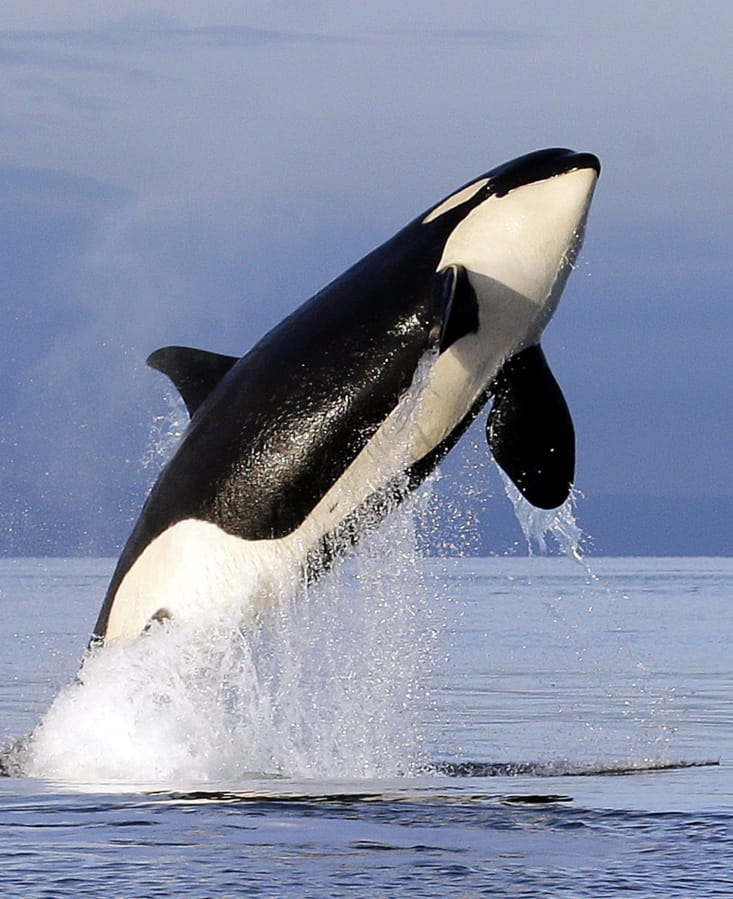Canada is taking steps to expand habitat protection for killer whales to boost survival of the critically endangered southern-resident population.
The Department of Fisheries and Oceans Canada announced Wednesday the department is initiating a 60-day comment period on creating new areas of critical habitat for the whales. One area is off the coast of southwestern Vancouver Island, including Swiftsure and La P?rouse banks (important for both northern and southern residents). The other is in Dixon Entrance, along the north coast of Graham Island from Langara to Rose Spit (important for northern residents).
The move to expand habitat protection comes on top of a reduction by the department of chinook salmon harvest by up to 35 percent for the 2018 fishing season, with a full closure of commercial and recreational fish for chinook in three key foraging areas for the southern residents: the Strait of Juan de Fuca, the Gulf Islands and the mouth of the Fraser River. These measures, enacted June 1, will continue until Sept. 30, and include increased monitoring to assess the effectiveness of the closures.
The critical-habitat designations could lead to further fishing reductions as well as restrictions on vessel traffic. The survival of southern-resident orcas — which are actually a large dolphin — is threatened because of underwater noise that disrupts their ability to hunt, as well as toxins and reduced availability of their primary prey, chinook salmon.
The conservation actions come as Canada also has initiated a $167 million whale initiative to boost orca survival, including a greatly increased research program.
“As a British Columbian, I know how the Southern Resident Killer Whale captures the imagination of Canadians and is a powerful symbol of British Columbia,” said Jonathan Wilkinson, minister of fisheries, oceans and the Canadian Coast Guard, in a press release.
“That is why we continue to take urgent actions to protect our Resident Killer Whales. Building on measures to address prey availability and vessel disturbances, we are proposing new additional critical habitat to help safeguard the future of these whales. We fully intend to keep our commitment to protect and support the recovery of Canada’s endangered Resident Killer Whales.”
Meanwhile, Canadian environmental groups have filed suit to require the Canadian government to immediately do more by issuing an emergency order to protect the southern residents, which use the trans-boundary waters of the Salish Sea. Filing the suit are Ecojustice, the David Suzuki Foundation, Georgia Strait Alliance, Natural Resources Defense Council, Raincoast Conservation Foundation and World Wildlife Fund Canada.
The suit comes on the heels of Canada’s dramatic reversal of the permit for construction of the Trans Mountain pipeline expansion, in part because earlier reviews of the project did not adequately assess its harm to southern resident killer whales.
It also follows the worldwide attention brought to the plight of the southern-resident killer whales by Tahlequah, or J35, as she swam more than 1,000 miles of the Salish Sea carrying her dead calf.
In Washington state, meanwhile, fishing continues as usual this year, habitat protection has not increased, and whale watching and other vessel regulations remain unchanged. The Legislature did fund an increase in patrols by the Washington Department of Fish and Wildlife of recreational boat traffic this summer during the whale-watch season.
A task force convened by Gov. Jay Inslee on orca recovery is continuing to work toward a list of recommendations due to the governor by November for consideration in the upcoming legislative session — a slower timeline for action than is transpiring across the border.
Environmental groups in the U.S. have also filed a lawsuit against the National Oceanic and Atmospheric Administration to compel an expansion of designated critical habitat for the southern residents that matches its own scientists’ data. That research shows the southern residents utilize the entire west coast of the U.S., yet the agency for years has failed to expand its designation of critical habitat, which today includes no coastal waters.
Meanwhile, another orca’s life hangs in the balance. J50, a severely emaciated southern resident, is the focus of an extraordinary ongoing trans-boundary effort of biologists and veterinarians to save her life, including darting her with antibiotics and a never-before-attempted feeding operation.
But it may already be too late: Other whales in as poor a body condition as J50, just over 3 years old, have not survived.



